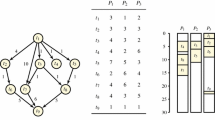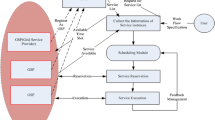Abstract
Task scheduling and resource allocation are important problems in grid computing. The workflow management system receives inter-dependent tasks from the users and allocates each task to an appropriate resource based on user requirements and constraints such as budget and deadline. Thus this system has a significant effect on performance and the efficient use of resources. In general, mapping tasks to distributed resources is an NP-hard problem. Hence, heuristic and meta-heuristic methods are typically employed. Moreover, since tasks can enter the system at any time, the task scheduling runtime is an important parameter for workflow management systems. This paper presents a fast method for scheduling workflows in a grid environment based on a multi-objective Genetic Algorithm (GA). In the proposed method, the workflows and chromosomes in the GA are assigned to levels to reduce the scheduling time. In addition, the proposed method prevents infeasible solutions being produced in new generations, so task dependencies do not need to be checked. New crossover and mutation operators are proposed to improve convergence and maintain solution diversity. Experimental results are presented and evaluated using several well-known metrics as well as a new metric. This shows the effectiveness of the proposed method compared to other approaches.
Similar content being viewed by others
References
Foster, I., Kesselman, C.: The Grid: Blueprint for a New Computing Infrastructure. Morgan Kaufmann Publishers, San Francisco (1998)
Broberg, J., Venugopal, S., Buyya, R.: Market-oriented grids and utility computing: the state-of-the-art and future directions. J. Grid Comput. 6 (3), 255–276 (2008)
Deelman, E., et al.: Pegasus: a framework for mapping complex scientific workflows onto distributed systems. J. Sci. Program. 13, 219–237 (2005)
Yu, J., Buyya, R.: Scheduling scientific workflow applications with deadline and budget constraints using genetic algorithms. J. Sci. Program. 14, 217–230 (2006)
Yu, J., Buyya, R.: A budget constrained scheduling of workflow applications on utility grids using genetic algorithms. J. Sci. Program. 14 (3,4), 217–230 (2006)
Foster, I., et al.: The Physiology of the Grid. Open Grid Service Infrastructure WG, Global Grid Forum (2002)
Benkner, S., et al.: VGE - a service-oriented grid environment for on-demand supercomputing. In: Fifth IEEE/ACM International Workshop on Grid Computing, Pittsburgh, PA, USA (2004)
Wieczorek, M., Prodan, R., Fahringer, T.: Scheduling of scientific workflows in the askalon grid environment. In: SIGMOD Record. 34,56–62 (2005)
Berman, F., et al.: New grid scheduling and rescheduling methods in the grads project. J. Parallel Prog. 33, 209–229 (2005)
Deelman, E., et al.: Mapping abstract complex workflows onto grid environments. J. Grid Comput. 1, 25–39 (2003)
Fahringer, T., et al.: ASKALON: a tool set for cluster and Grid computing. J. Concurr. Comput. Pract. Exp. 17, 143–169 (2005)
Ludäscher, B., et al.: Scientific workflow management and the KEPLER system. J. Concurrency and Computation: Practice & Experience, Special Issue on Scientific Workflows (2005)
Neubauer, F., Hoheisel, A., Geiler, J.: Workflow-based Grid Applications. J. Futur. Gener. Comput. Syst. 22, 6–15 (2006)
Oinn, T., et al.: Taverna: a tool for the composition and enactment of bioinformatics workflows. Bioinformatics 20 (17), 3045–3054 (2004). Oxford University Press, London, UK
Yu, J., Buyya, R.: Taxonomy of Workflow Management Systems for Grid Computing, Vol. 3. Spring Science and Business Media B.V., New York, USA (2005)
Wieczorek, M., Prodan, R., Hoheisel, A.: Taxonomies of the Multi-criteria Grid Workflow Scheduling Problem. CoreGRID Technical Report Number TR-0106 (2007)
Wieczorek, M., Hoheisel, A., Prodan, R.: Towards a general model of the multi-criteria workflow scheduling on the grid. J. Futur. Gener. Comput. Syst. 25, 237–256 (2009)
Gharooni-fard, G., Moein-darbari, F., Deldari, H., Morvaridi, A.: Scheduling of scientific workflows using a chaos-genetic algorithm. In: Proceedings Computer Science. 1, 1445–1454 (2012)
Garey, M.R., Johnson, D.S.: Computers and Intractability: A Guide to the Theory of NP-Completeness. Freeman, New York (1979)
Haluk, T., et al.: Performance-effective and low-complexity task scheduling for heterogeneous computing. IEEE Trans. Parallel Distrib. Syst. 13, 260–274 (2002)
Daoud, M.I., Kharma, N.: A high performance algorithm for static task scheduling in heterogeneous distributed computing systems. J. Parallel Distrib. Comput. 68 (4), 399–409 (2008)
Daoud, M., Kharma, N.: GATS 1.0: A novel GA-based scheduling algorithm for task scheduling on heterogeneous processor nets. In: Proceedings of the 2005 Conference on Genetic and Evolutionary Computation, pp. 2209–2210. ACM, New York (2005)
Zhong, Y.W., Yang, J.G.: A genetic algorithm for tasks scheduling in parallel multiprocessor systems. In: International Conference on Machine Learning and Cybernetics, X’ian, China. 3, pp. 1785–1790 (2003)
Kim, S.C., Lee, S.: Push-pull: Guided search dag scheduling for heterogeneous clusters. In: International Conference on Parallel Processing, ICPP 2005, pp. 603–610. University of Oslo, Norway (2005)
Prodan, R., Wieczorek, M.: Negotiation-based scheduling of scientific grid workflows through advance reservations. J. Grid Comput. 8 (4), 493–510 (2010)
Gkoutioudi, K.Z., Helen, D.K.: Multi-criteria job scheduling in grid using an accelerated genetic algorithm. J. Grid Comput. 10 (2), 311–323 (2012)
Tao, Y., et al.: Dependable grid workflow scheduling based on resource availability. J. Grid Comput., 1–15 (2013)
Cao, F., Zhu, M.M.: Distributed workflow mapping algorithm for maximized reliability under end-to-end delay constraint. J. Supercomput., 1–27 (2013)
Garg, R., Singh, A.K.: Multi-objective optimization to workflow grid scheduling using reference point based evolutionary algorithm. J. Comput. Appl. 22 (6), 44–49 (2011)
Yu, J., Buyya, R.: Multi-objective planning for workflow execution on Grids. In: Proceedings of the 8th IEEE/ACM International Conference on Grid Computing, pp. 10–17 (2007)
Talukder, A., Kirley, M., Buyya, R.: Multiobjective Differential Evolution for Scheduling Workflow Applications on Global Grids. John Wiley, Chichester (2009)
Bhat, D.N.: An evolutionary measure for image matching. In: Fourteenth International Conference on Pattern Recognition, pp. 850–852. IEEE Press, New York (1998)
He, X., Sun, X.H., Laszewski, G.V.: QoS guided min–min heuristic for grid task scheduling. J. Comput. Sci. Technol. 18 (4), 442–451 (2003)
Tao, Q., Chang, H., Yi, Y., Gu, C.: A Grid Workflow Scheduling Optimization Approach for e-Business Application. In: International Conference on E-Business and E-Government, pp. 198–171 (2010)
Verboven, S., Hellinckx, P., Arickx, F., Broeckhove, J.: Runtime Prediction Based Grid Scheduling of Parameter Sweep Jobs: In: Proceedings Asia-Pacific Conf. Services Computing, pp. 33–38 (2008)
Holland, J.H.: Adaptation in natural and artificial systems. In: Ann Arbor: University of Michigan Press (1975)
Deb, K.: Multi-Objective Optimization using Evolutionary Algorithms. Wiley, England (2001)
Konak, A., Coit, D.W., Smith, A.E.: Multi-objective optimization using genetic algorithms: A tutorial. J. Reliab. Eng. Syst. Saf. 91 (8), 992–1007 (2006)
Goldberg, D.: Genetic Algorithms in Search, Optimization, and Machine Learning. Addison-Wesley (1989)
Knowles, J.D., Corne, D.: The Pareto Archived Evolution Strategy:A New Baseline Algorithm for Pareto Multiobjective Optimisation. In: Proceedings of the Congress on Evolutionary Computation (CEC’99). 1, pp. 98–105 (1999)
Deb, K., Pratap, A., Agarwal, S., Meyarivan, T.: A fast and elitist multiobjective genetic algorithm: NSGA-II. IEEE Trans. Evol. Comput. 6 (2), 182–197 (2002)
Schaffer, J.D.: Multiple objective optimization with vector evaluated genetic algorithms. In: Proceedings of the International Conference on Genetic Algorithm and their Applications (1985)
Zitzler, E., Laumanns, M., Thiele, L.: SPEA2: Improving the Strength Pareto Evolutionary Algorithm for Multiobjective Optimization. In: Evolutionary Methods for Design, Optimization, and Control. 1, pp. 19–26 (2002)
Yen, G.G., Lu, H.: Dynamic multiobjective evolutionary algorithm: adaptive cell-based rank and density estimation. IEEE Trans. Evol. Comput. 7 (3), 253–74 (2003)
Hirales-Carbajal, A., et al.: Multiple workflow scheduling strategies with user run time estimates on a grid. J. Grid Comput. 10 (2), 325–346 (2012)
Abrishami, S., Naghibzadeh, M., Epema, D.H.: Cost-driven scheduling of grid workflows using partial critical paths. IEEE Trans. Parallel Distrib. Syst. 23 (7), 1400–1414 (2012)
Bharathi, S., Chervenak, A., Deelman, E., Mehta, G., Su, M.-H., Vahi, K.: Characterization of Scientific Workflows. In: Third Workshop Workflows in Support of Large Scale Science (2008)
Knowles, J., Thiele, L., Zitzler, E.: A tutorial on the performance assessment of stochastic multiobjective optimizers. Technical Report 214, Computer Engineering and Networks Laboratory (TIK), ETH Zurich, Switzerland (2006)
Zitzler, E., Thiele, L., Laumanns, M., Fonseca, C.M., Fonseca, V.: Performance assessment of multiobjective optimizers: an analysis and review. IEEE Trans. Evol. Comput. 7 (2), 117–132 (2003)
Deb, K., et al.: A fast elitist multi-objective genetic algorithm: NSGA-II. J. Parallel Probl. Solv Nat. VI, 849–858 (2002)
Singh, G., Kesselman, C., Deelman, E.: Optimizing grid-based workflow execution. J. Grid Comput. 3 (3–4), 201–219 (2006)
Author information
Authors and Affiliations
Corresponding author
Rights and permissions
About this article
Cite this article
Khajemohammadi, H., Fanian, A. & Gulliver, T.A. Efficient Workflow Scheduling for Grid Computing Using a Leveled Multi-objective Genetic Algorithm. J Grid Computing 12, 637–663 (2014). https://doi.org/10.1007/s10723-014-9306-7
Received:
Accepted:
Published:
Issue Date:
DOI: https://doi.org/10.1007/s10723-014-9306-7




